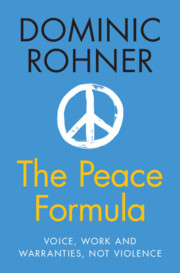3 results

The Peace Formula
- Voice, Work and Warranties, Not Violence
-
- Published online:
- 31 August 2024
- Print publication:
- 15 August 2024
12 - Conclusion
- from Part IV - The Art of Peace
-
- Book:
- The Peace Formula
- Published online:
- 31 August 2024
- Print publication:
- 15 August 2024, pp 187-199
-
- Chapter
- Export citation
1 - Smart Idealism and the Peace Formula
- from Part I - Apocalypse No!
-
- Book:
- The Peace Formula
- Published online:
- 31 August 2024
- Print publication:
- 15 August 2024, pp 3-19
-
- Chapter
- Export citation

